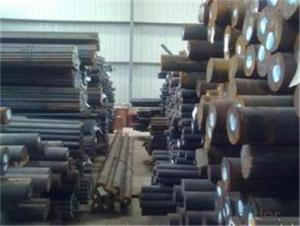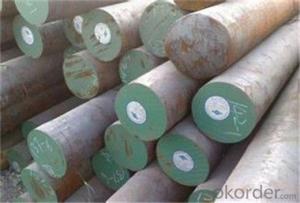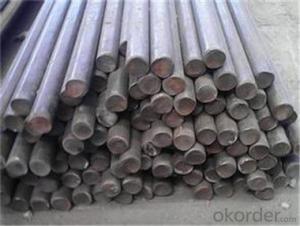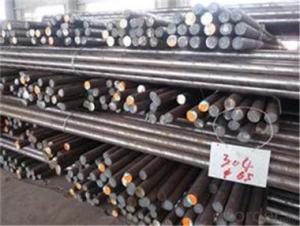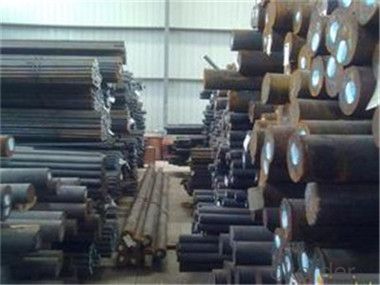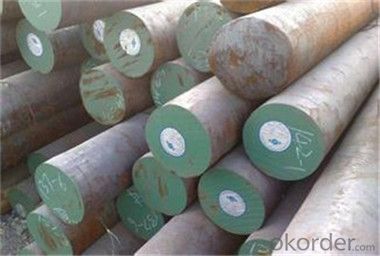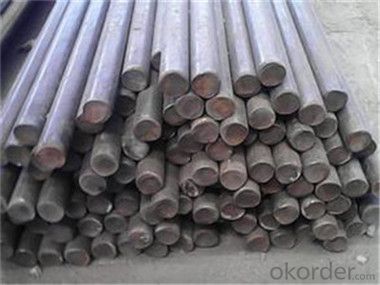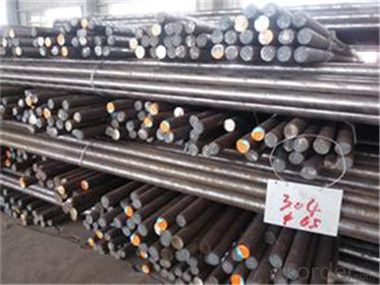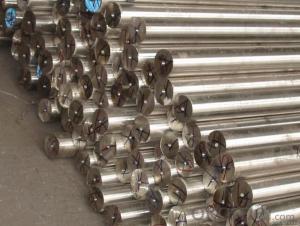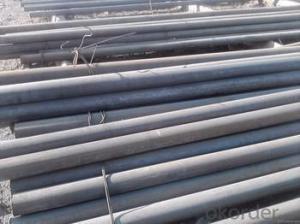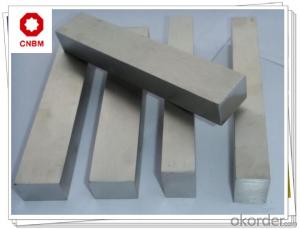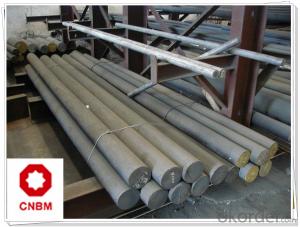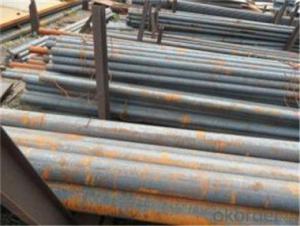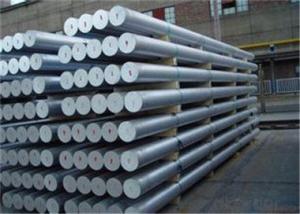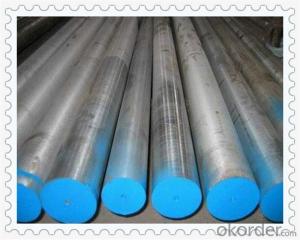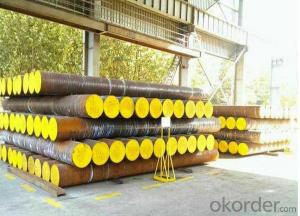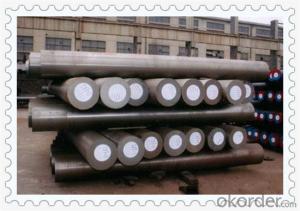42CrMO SCM440 Forged or Hot Rolled Sae 4140 Steel Round Bars
- Loading Port:
- Tianjin
- Payment Terms:
- TT OR LC
- Min Order Qty:
- 70 m.t.
- Supply Capability:
- 2000000 m.t./month
OKorder Service Pledge
OKorder Financial Service
You Might Also Like
Description of steel round bar:
Mild Steel Round Bar is used for making security grills, screens, Construction and Machine Manufacture.Stainless steel bar is widely used in Architecture,Machine Manufacture,Power Station,Electric Equipment and Factory,Oil and Chemical Industry,Food and Medical Industry,City Decoration Industry
Festures of steel round bar:
Length: standard 6m,9m,12m, or as customers' requirement
Surface: Black, polished, grinded, ,Bright, Turn smooth(Peeled),Brush,Mill,Pickled
Process:Hot rolled,cold drawn,forged
Packing: In bundle, tied by steel straps, covered with protecting film
Use wooden box, fill with foam to keep the surface from damaging
Specifications of steel round bar:
Description : Steel Bar/Stainless Steel Round Bar/Alloy Steel Round Bar/Carbon Steel Bar
Stainless Steel Bright Bar/Stainless Steel Peeled Bar/Stainless Steel Polishing Bar
Diamater:
1 Hot rolled round bar diameter from 5.5mm to 110mm
2.Hot forged round bar diameter from 110mm to 400mm
3.Cold drawn round bar diameter from 2.0mm to 60mm
4.Grinding bar diameter from 4.0mm to 40mm
5.Turn smooth diameter from 40mm to 250mm
Images of steel round bar:
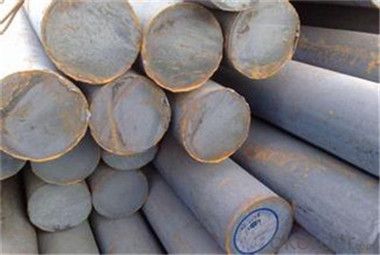
FAQ:
1. What is your main market?
We mainly export to Asia such as Japan,Korea,Thailand and North America and Middle East.
2. How long is the lead time?
Delivery time: 45 days after order confirmed.
3. What payment term do you accept?
Payment: T/T or L/C at sight.
4.Why do you choose to cooperate with us?
We have over10 years experience in this business so we are able to provide you the high quality products with the best price.
- Q: Can steel round bars be used for making steering linkages?
- Yes, steel round bars can be used for making steering linkages. Steel round bars are commonly used in various mechanical applications due to their strength and durability. They offer the necessary stability and rigidity required for steering linkages, making them a suitable choice for this purpose.
- Q: What are steel round bars?
- Steel round bars are cylindrical metal rods made from steel that are typically used in construction, manufacturing, and engineering applications. They have a circular cross-section and are known for their strength, durability, and versatility. These bars are commonly used to provide structural support, reinforcement, or as machined components in a wide range of industries.
- Q: What are the common sizes and dimensions of steel round bars?
- Steel round bars come in a variety of sizes and dimensions to cater to different applications and requirements. The most common sizes and dimensions of steel round bars include diameters ranging from 1/4 inch to 24 inches. These diameters correspond to the nominal size of the round bar, which represents the approximate measurement of the bar's cross-sectional diameter. In terms of dimensions, steel round bars are typically available in standard lengths of 20 feet or 6 meters. However, custom lengths can be produced upon request. The length of the round bar is crucial as it determines the amount of material available for cutting, shaping, and fabrication. Additionally, the weight of steel round bars can vary depending on their size. Steel is typically measured by its weight per unit length, commonly expressed in pounds per foot or kilograms per meter. The weight of a steel round bar is influenced by the diameter, length, and specific type of steel used. It is worth noting that the sizes and dimensions mentioned above are standard in the industry, but there may be variations depending on the specific manufacturer or supplier. Therefore, it is always advisable to consult the manufacturer's catalog or contact them directly to obtain accurate and up-to-date information on the sizes and dimensions of steel round bars they offer.
- Q: Can steel round bars be used in the production of power tools?
- Yes, steel round bars can be used in the production of power tools. Steel round bars are often used as raw materials for manufacturing various components and parts of power tools due to their high strength, durability, and resistance to impact and wear. These bars can be machined, shaped, and heat-treated to create the necessary components, such as shafts, handles, and gears, that are crucial for the proper functioning of power tools.
- Q: What are the common applications of steel round bars?
- Steel round bars are widely used in various industries due to their strength, versatility, and durability. Some common applications of steel round bars include: 1. Construction: Steel round bars are commonly used in construction projects such as building frames, bridges, and infrastructure. They provide structural support and can withstand heavy loads. Additionally, steel round bars are often used as reinforcement in concrete structures, increasing their strength and resilience. 2. Manufacturing: Steel round bars are utilized in the manufacturing industry for the production of various components and machinery. They are commonly used in the fabrication of gears, shafts, couplings, and axles, as they possess excellent machinability and can withstand high levels of stress and pressure. 3. Automotive: Steel round bars are extensively used in the automotive industry for manufacturing critical components like crankshafts, steering systems, suspension parts, and axles. Due to their high tensile strength and resistance to wear and tear, steel round bars play a crucial role in ensuring the safety and reliability of vehicles. 4. Aerospace: The aerospace industry relies heavily on steel round bars for the production of aircraft components, including landing gear, propeller shafts, and structural elements. Steel's high strength-to-weight ratio and excellent fatigue resistance make it an ideal choice for withstanding the extreme conditions experienced in aerospace applications. 5. Energy and power: Steel round bars are used in the energy and power sector for manufacturing equipment like turbines, generators, and power transmission systems. Steel's ability to handle high temperatures and its resistance to corrosion make it a suitable material for these applications. 6. Oil and gas: Steel round bars find extensive use in the oil and gas industry for the production of drilling equipment, pipelines, and valves. Steel's resistance to corrosion and high-pressure environments makes it an essential material in this sector. In summary, steel round bars have a wide range of applications across industries due to their strength, versatility, and resistance to wear and tear. They play a crucial role in construction, manufacturing, automotive, aerospace, energy, and power, as well as the oil and gas industry.
- Q: What are the different types of steel round bar machining processes?
- There are several different types of steel round bar machining processes, including turning, milling, drilling, grinding, and threading. Each process serves a specific purpose and is used to shape the steel round bar into a desired form or size.
- Q: How do you determine the appropriate steel grade for a specific application?
- To determine the appropriate steel grade for a specific application, it is necessary to have a comprehensive understanding of the application's requirements and the properties of different steel grades. The following steps should be considered: 1. Begin by clearly defining the specific requirements of the application, such as load-bearing capacity, corrosion resistance, temperature resistance, and durability. Take into account factors such as the environment the steel will be exposed to, the expected stress levels, and any specialized characteristics needed. 2. Research the various steel grades available in the market once the application requirements are understood. Identify steel grades known for possessing the desired properties required for the specific application. Consult industry standards, expert opinions, and available resources to gain insights into different steel grades and their performance in similar applications. 3. Analyze the physical, mechanical, and chemical properties of the steel grades under consideration. Evaluate key properties such as strength, ductility, toughness, hardness, corrosion resistance, weldability, and formability. Compare these properties with the application requirements to determine which steel grades align best with the specific needs. 4. Evaluate the cost and availability of the steel grades that meet the application requirements. Take into account factors such as the initial cost, maintenance costs, and availability of the steel grade in the required form and quantity. This step ensures that the chosen steel grade is not only suitable but also feasible from an economic perspective. 5. Seek advice from experts, such as metallurgists or engineers, to gain valuable insights into selecting the appropriate steel grade. Their expertise and experience can help weigh the pros and cons of different steel grades, identify potential challenges, and suggest alternatives or modifications if necessary. 6. If feasible, conduct testing or trials using samples of the selected steel grade to assess its performance under real-world conditions. This step can help validate the suitability of the chosen steel grade and identify any unforeseen issues or areas for improvement. By carefully considering the application requirements, researching steel grades, evaluating material properties, considering cost and availability, seeking expert advice, and conducting testing and trials, one can effectively determine the appropriate steel grade for a specific application.
- Q: How are steel round bars inspected for quality?
- Steel round bars are inspected for quality through various methods such as visual inspection, dimensional measurements, and non-destructive testing techniques. These inspections involve checking for surface defects, ensuring accurate dimensions, and detecting any internal flaws or inconsistencies. Additionally, quality control measures may include hardness testing, chemical analysis, and mechanical property evaluations to ensure the steel bars meet the required standards and specifications.
- Q: How do steel round bars perform under torsion or twisting forces?
- Steel round bars perform very well under torsion or twisting forces due to their high tensile strength and excellent resistance to deformation. They have a strong resistance to twisting and can withstand significant torque without breaking or deforming. This makes them suitable for applications where torsional stresses are involved, such as in shafts, axles, and other mechanical components.
- Q: What are the different types of steel round bar alloys used in aerospace applications?
- The different types of steel round bar alloys used in aerospace applications include stainless steel, nickel-based alloys, and titanium alloys. These alloys are chosen for their high strength-to-weight ratios, corrosion resistance, and ability to withstand extreme temperatures and pressures encountered in aerospace environments.
Send your message to us
42CrMO SCM440 Forged or Hot Rolled Sae 4140 Steel Round Bars
- Loading Port:
- Tianjin
- Payment Terms:
- TT OR LC
- Min Order Qty:
- 70 m.t.
- Supply Capability:
- 2000000 m.t./month
OKorder Service Pledge
OKorder Financial Service
Similar products
Hot products
Hot Searches
Related keywords
